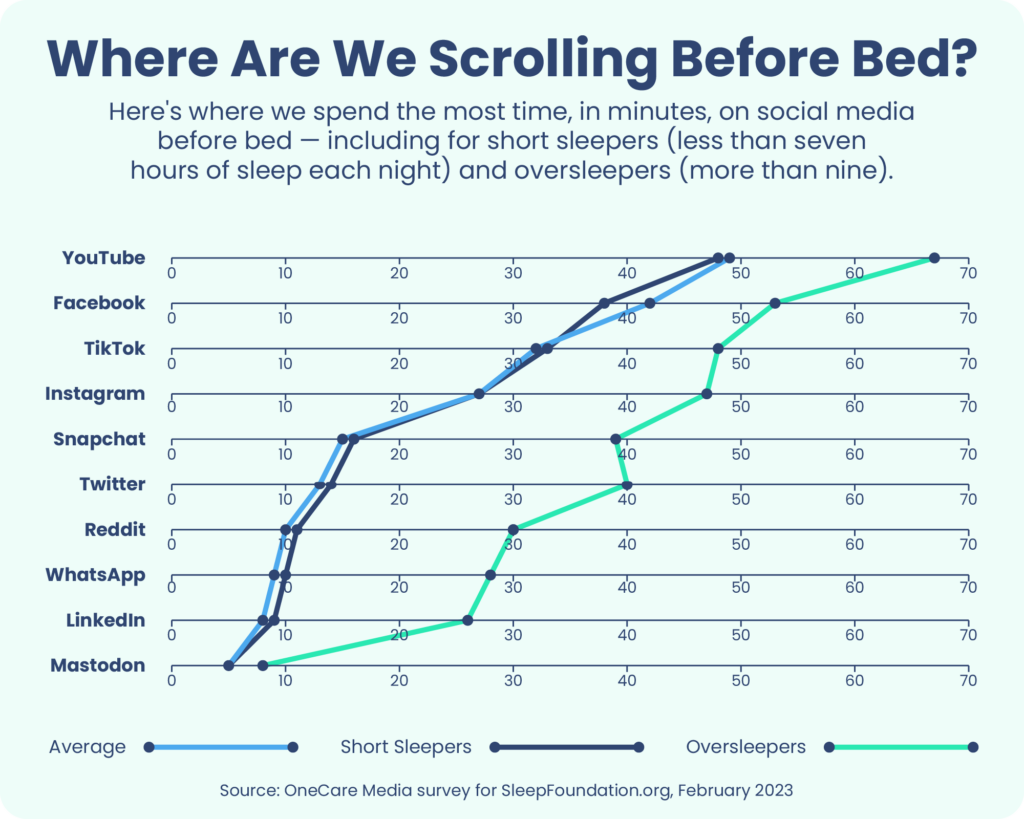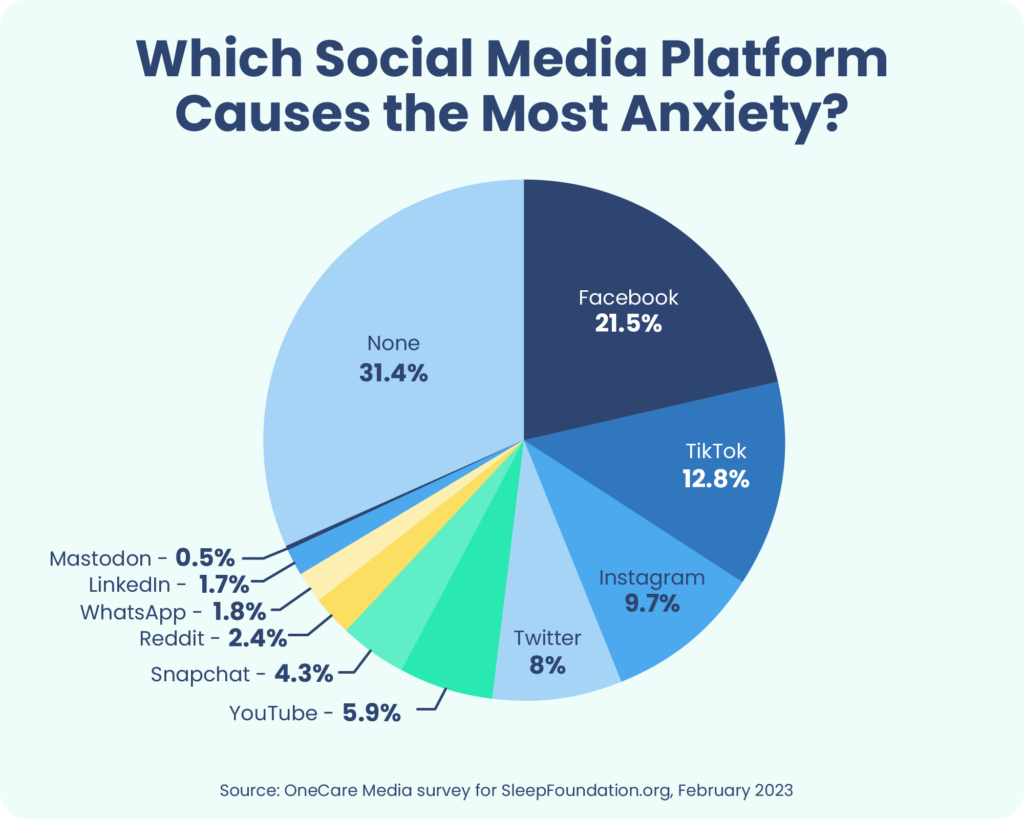Social Media Dominates Pre-Bedtime Routine for U.S. Adults, Survey Finds
- U.S. adults spend 3.5 hours on social media before bed each day, according to a survey.
- 74.7% of social media use occurs before bed, according to the survey.
- Among social media platforms, Facebook is the most likely to cause us anxiety.
- 55.2% of U.S. adults check Facebook first thing after waking up.
- 73.8% of adults who use social media before bed turn to YouTube.
- Adults who use Instagram, Snapchat, or TikTok before bed sleep at least two minutes more than average each night.
Simona Asinovski, 34, co-founded a company that makes a meditation app. But even she struggles when it’s time to put down the phone and focus on falling asleep at night.
“Many nights, I’m listening to music or on social media and forcing myself to [stop],” Asinovski says. “There’s this part of my mind that says, ‘Maybe four more posts; maybe one more song.'”
On average, U.S. adults spend 3.5 hours on social media before bed every night, comprising 74.7% of their daily use, according to a February 2023 survey by Sleep Doctor, the parent company of SleepFoundation.org. Three-quarters of survey respondents say they use at least one of the major social-media platforms before going to sleep each night.
Got a hot tip? Pitch us your story idea, share your expertise with SleepFoundation.org, or let us know about your sleep experiences right here.
Studies have long linked the effects of social-media use to poor sleep quality , insomnia, and short sleep , or sleeping less than seven hours a night. Meanwhile, many of us are also turning to social media to help us sleep.
So is social media actually wrecking our sleep or repairing it? Or are some platforms better than others?
Is It Really ‘YouTube and Chill’?
The survey looked at use of 10 of the most popular social media platforms, from Facebook and Twitter to the relatively new Mastodon.
YouTube was the most used before bed, with 73.8% of respondents using it for at least one minute, just above the 72% using Facebook. Instagram was third, with 58.2% of surveyed adults using it before bed.
YouTube also is the social media platform that we use the longest before bed, at 48 minutes a night. Adults who use it for at least a minute average 1 hour, 20 minutes of YouTube viewing each day, also No. 1 among social media platforms.

Because YouTube has so many lullabies, white noise videos, and other sleep-friendly content, it may be especially popular for those seeking sleep . And 48.2% of survey respondents report that it does help them sleep, also the highest among platforms.
The context of social media use matters just as much as how much we use it, says Linda Charmaraman, Ph.D., a senior research scientist at the Wellesley Centers for Women and director of the Youth, Media & Wellbeing Research Lab in Wellesley, Massachusetts.
“It’s not just the users and how they use technology, but also the social context around their use. Are they feeling hooked?” she says.
Just 68.6% of survey respondents’ YouTube use occurred before bed, the lowest percentage among social media platforms. Some 88.7% of LinkedIn use occurred at bedtime, the highest among platforms surveyed.
So is YouTube eating into our sleep? Not exactly: Its users report sleeping exactly the same amount as the survey average.

What’s the Connection Between Social Media and Sleep?
A recent study from the American Academy of Sleep Medicine, however, found that 80% of U.S. adults report losing sleep because of social media use. That increases to 93% among those ages 18 to 25.
Charmaraman published research in 2021 showing the same sleep issues among social media users ages 11 to 15 , as well.
Elementary educator Anne Hsu Gibson is from Boulder, Colorado, says she has tried making her 16-year-old son bring his phone to her bedroom at 11 p.m. on school nights and midnight on weekends.
“He will play games and watch TikTok videos and then start his homework at 11 p.m. and go to bed after that,” she says. “He will say, ‘Oh, I want to listen to music while doing my homework.’ Or I will have to ask, remind, and follow up. [His phone is] rarely in by the designated time.”
What social media platform may be the culprit for sleep issues? Facebook overtakes YouTube as the most popular platform among short sleepers, with 76% of people who get less than seven hours of sleep a night using it before bed. It’s also No. 1 among adults who take more than 30 minutes to fall asleep, considered above normal sleep latency, at 74.8%.
Facebook use isn’t just at night. More than half of respondents (55.2%) check Facebook as soon as they wake up, well more than No. 2 Instagram (31.4%). This habit is more common for people who work in or make money from social media: More than 65% of them check Facebook when they get up, and more than half view Instagram first thing in the morning.
What Social Media Stress Us Out the Most?
When it comes down to sleep lost to social media, Facebook lands in the top three, right after LinkedIn and Mastodon.
Facebook’s nightly users sleep five minutes less than average every night. Respondents who use LinkedIn before bed sleep nine minutes less than average. Mastodon users, who comprise just 9.4% of respondents, reported sleeping 35 minutes less than average. On the other hand, nightly users of Instagram, Snapchat, and TikTok report sleeping at least two minutes more than average each night.
According to the survey, Facebook also causes us the most anxiety, with 21.5% of respondents ranking it as such. TikTok is a distant second at 12.8%.

This anxiety could be attributed to the fear of missing out, commonly known as FOMO. It is good to avoid, Charmaraman says, and it can affect sleep in numerous ways.
“A lot of teenagers sleep with their phone under the pillow to feel the buzzes because that helps [them] feel safe,” she says.
People who experience higher levels of FOMO are more likely to check their social media close to bedtime, making it difficult to fall asleep.
What folks watch or read can make a difference, too. Charmaraman says watching emotional or violent things before bed factors into later bedtimes and fewer hours of sleep on a typical weeknight, especially for adolescents. She recommends staying away from upsetting things before bed and says users may also want to avoid triggering content such as idealized beauty, natural disasters, current events, and political mudslinging.
“When you’re seeing that on your feed, it will probably raise your heart rate and maybe make it harder for you to fall asleep,” Charmaraman says.
Sleeping Well While Staying Connected
After YouTube, respondents listed TikTok (28.6%), Facebook (26.9%), and Instagram (21.8%) as social media platforms that help them sleep. The type of content they found useful includes the following:
- Music
- Religious scripture
- Autonomous sensory meridian response, or ASMR
- Ocean and water sounds
Following healthy sleep habits while monitoring your social media intake can be a significant nudge toward achieving better quality sleep. But is there a trick to using social media the right way while trying to fall asleep?
Asinovski, for instance, relies on a timer to make sure she logs off with enough time to unwind before bed. Charmaraman says that when it comes to content itself, seek something to calm your mind before bedtime.
“[Look at] positive things that make you feel more relaxed such as cute animals, designs that are pleasant to look at, and travel pictures that get you in dreamland,” she says.
Methodology
The survey commissioned by Sleep Doctor, the parent company of SleepFoundation.org, was conducted on the online survey platform Pollfish on Feb. 3, 2023. Results are from 1,250 survey participants in the United States who were ages 18 and older at the time of the survey. All respondents attested to answering the survey questions truthfully and accurately.
References
6 Sources
-
Al Kazhali, M., Shahwan, M., Hassan, N., & Jairoun, A. A. (2023). Social media use is linked to poor sleep quality: The opportunities and challenges to support evidence-informed policymaking in the UAE. Journal of public health (Oxford, England), 45(1), 124–133.
https://pubmed.ncbi.nlm.nih.gov/34693449/ -
Bhat, S., Pinto-Zipp, G., Upadhyay, H., & Polos, P. G. (2018). “To sleep, perchance to tweet”: in-bed electronic social media use and its associations with insomnia, daytime sleepiness, mood, and sleep duration in adults. Sleep health, 4(2), 166–173.
https://pubmed.ncbi.nlm.nih.gov/29555130/ -
Eke, R., Li, T., Bond, K., Ho, A., & Graves, L. (2020). Viewing Trends and Users’ Perceptions of the Effect of Sleep-Aiding Music on YouTube: Quantification and Thematic Content Analysis. Journal of medical Internet research, 22(8), e15697.
https://pubmed.ncbi.nlm.nih.gov/32831182/ -
American Academy of Sleep Medicine Sleep Prioritization Survey. (2022). Social Media Impact on Sleep., Retrieved March 20, 2023.
https://aasm.org/wp-content/uploads/2022/09/sleep-prioritization-survey-social-media.pdf -
Charmaraman, L., Richer, A. M., Ben-Joseph, E. P., & Klerman, E. B. (2021). Quantity, Content, and Context Matter: Associations Among Social Technology Use and Sleep Habits in Early Adolescents. The Journal of adolescent health : official publication of the Society for Adolescent Medicine, 69(1), 162–165.
https://pubmed.ncbi.nlm.nih.gov/33148478/ -
Przybylski, A. K., Murayama, K., DeHaan, C. R., Gladwell, V. (2013). Motivational, emotional, and behavioral correlates of fear of missing out. Computers in Human Behavior, 29(4), 1841-1848.
https://linkinghub.elsevier.com/retrieve/pii/S0747563213000800








